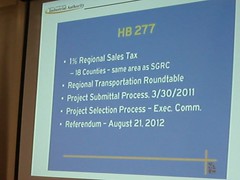Here’s what Lowndes County submitted for T-SPLOST funding, extracted from the 171 page PDF.
Category Archives: Planning
San Antonio promises to shut down a coal plant
At an event this afternoon at UT-San Antonio, Mayor Julian Castro announced a suite of green energy projects that he said would position San Antonio as the nation’s “recognized leader in clean energy technology” and help fulfill his aggressive environmental goals.
Most notably, Castro and leaders from CPS Energy, the city-owned utility, pledged to shut down one of its coal-fired power plants 15 years ahead of schedule. By 2018, the city would mothball the 871-megawatt J.T. Deely Power Plant — a bold move in a growing state that’s seemingly addicted to coal.
So what are they going to use for energy? Continue reading
Southern Company committed to communities, renewable energy, energy efficiency
According to PR from Southern Company, 25 May 2011, Southern Company Holds Annual Meeting of Shareholders
Sure, he listed renewable energy and energy efficiency last. But this is the same Thomas A. Fanning who said in May that he’s “bullish” on solar. The same CEO of the parent company of Georgia Power, which just connected a 300 kiloWatt solar plant in Lowndes County. The same CEO who’s being nagged by the Georgia PSC chairman “to come up with options in the next 30 days for expanding the tiny amount of electricity generated from solar power.” And a company that spends more than $20 billion on new energy projects can afford a few tens of millions for community refitting and solar.Fanning also emphasized a continued commitment to the communities the company serves and stressed the need for a national energy policy and a robust research and development initiative.
“Southern Company keeps customers at the center of every decision we make,” said Fanning. “We remain committed to providing reliable, affordable energy for our customers and to do that we need to maintain a diverse fuel mix as well as stay focused on developing the newest technologies.”
Referencing a diverse fuel mix, Fanning highlighted the company’s commitment to nuclear energy, including building the nation’s first new units in 30 years. He also discussed the importance of preserving coal – America’s most abundant energy resource – as well as the role of natural gas, renewable energy and energy efficiency in meeting its customers energy needs.
“Furthermore, we are the only company in the industry that is doing it all. We’ve committed more than $20 billion to these efforts,” Fanning said.
-jsq
Call Off the Global Drug War —Jimmy Carter
Imagine that! A drug policy meant to address the problem.… has made some courageous and profoundly important recommendations in a report on how to bring more effective control over the illicit drug trade. The commission includes the former presidents or prime ministers of five countries, a former secretary general of the United Nations, human rights leaders, and business and government leaders, including Richard Branson, George P. Shultz and Paul A. Volcker.
The report describes the total failure of the present global antidrug effort, and in particular America’s “war on drugs,” which was declared 40 years ago today. It notes that the global consumption of opiates has increased 34.5 percent, cocaine 27 percent and cannabis 8.5 percent from 1998 to 2008. Its primary recommendations are to substitute treatment for imprisonment for people who use drugs but do no harm to others, and to concentrate more coordinated international effort on combating violent criminal organizations rather than nonviolent, low-level offenders.
These recommendations are compatible with United States drug policy from three decades ago. In a message to Congress in 1977, I said the country should decriminalize the possession of less than an ounce of marijuana, with a full program of treatment for addicts. I also cautioned against filling our prisons with young people who were no threat to society, and summarized by saying: “Penalties against possession of a drug should not be more damaging to an individual than the use of the drug itself.”
How did we go wrong? Continue reading
Ashley Paulk, Corey Hull, and Norman Bennett on T-SPLOST
 Jane Osborn pointed us at
a detailed list of T-SPLOST projects.
Jane Osborn pointed us at
a detailed list of T-SPLOST projects.
T-SPLOST regional executive committee chairman
Ashley Paulk
 gave his opinion on T-SPLOST at a Lowndes County Democratic Party
(LCDP) meeting a few months ago:
He’s against it
because he doesn’t like
a law with a stick in it.
gave his opinion on T-SPLOST at a Lowndes County Democratic Party
(LCDP) meeting a few months ago:
He’s against it
because he doesn’t like
a law with a stick in it.
At the same LCDP meeting, Corey Hull of VLMPO explained T-SPLOST, which LAKE videoed in six parts,
-
 T-SPLOST Explained
T-SPLOST Explained
- T-SPLOST Business plan
- T-SPLOST Project Lists
- T-SPLOST Penalties and LMIG
- T-SPLOST Projects to GDOT
- T-SPLOST referendum in 2012
Before that, Corey Hull explained T-SPLOST to VLCIA,
 and got
a very interesting question about penalties from Norman Bennett.
and got
a very interesting question about penalties from Norman Bennett.
VLMPO held an extended public participation period for T-SPLOST in May. Maybe some of you who went can report back on that.
-jsq
Birmingham U.K. municipal solar didn’t wait for larger governments
According to Larry Elliott in the Guardian, 3 October 2010, 10,000 Birmingham council homes to get solar panels: City agrees £100m scheme, partly funded by banks and energy suppliers, to meet target for cutting carbon emissions
Energy efficiency and solar power to create jobs!Plans to fit power generating solar panels to council-owned properties in Birmingham will be pushed forward this week after the council agreed a “green new deal” scheme covering 10,000 homes.
In the biggest proposal for retrofitting houses through an energy efficiency upgrade yet seen in the UK, the council agreed a £100m proposal last week designed to create jobs and meet the city’s ambitious targets for reducing carbon emissions.
The plan – Birmingham Energy Savers – will be jointly funded by Birmingham council and investment from energy suppliers and commercial banks, and follows two successful pilot schemes conducted in Europe’s biggest local authority.
We have local proof of concept right next door Continue reading
Valdosta budget hearing: no citizens spoke
David Rodock wrote today in the VDT, Valdosta’s 2012 budget reviewed by citizens and public officials
No citizens. I don’t live in Valdosta, so I didn’t go. Apparently no Valdosta residents who have any economic concerns went, either.City officials and staff gathered Wednesday night to discuss and review the fiscal year 2012 budget. Public participation was advertised, but no citizens presented any concern at the meeting. This is the first budget hearing, with the final adoption of the budget taking place at the upcoming regular City Council meeting on June 23 at 5:30 p.m.
That’s too bad, because among the items discussed was this:
And I bet the city spends significant funds air conditioning its buildings. Costs that could be offset by investment in solar panels for those same buildings. Solar panels that would limit ongoing electrical expenditures, and would also be a visible sign to residents and potential investors that Valdosta means renewable and sustainable energy business.
- Energy and fuel prices are a threat, since the private sector controls the costs. Public Works, the Valdosta Fire Department and the Valdosta Police Department use significant amounts of fuel.
According to Hanson, for every dollar spent by residents, $1.17 is spent by non-residents.And many of those non-residents would see those solar panels, which would spread the green reputation of Valdosta back to whereever they came from.
If Valdosta wants to be forward-looking, Continue reading
“I’m obviously here on one issue.” —Karen Noll @ VLCIA 14 June 2011
 Karen Noll asked the VLCIA board to put a no-biomass clause
in any purchase agreement regarding the proposed biomass site.
Karen Noll asked the VLCIA board to put a no-biomass clause
in any purchase agreement regarding the proposed biomass site.
She began with these words:
I’m Karen Noll. I hope some of you already have seen my writing and have read my letters to you in the past. I’m obviously here on one issue. I hope that in the future I can be talking to you about other issues. But right now I’m talking to you about biomass. And we celebrated that it was dead and it was gone and now it’s not. Because we really don’t know … what the plan is.By “we” I’m guessing she meant WACE. Some of us who are not members of WACE warned that it ain’t over until it’s over, and it only took a week to discover that VLCIA already knew Sterling Planet wanted to buy the proposed biomass site.
Karen Noll made a pitch based partly on saving taxpayer money. In addressing health concerns, she handed the board a letter from local doctor Craig Bishop. She handed the board a petition with “at least 700 signatures” and she said for each signature there was probably at least one more that didn’t sign. Some of what she said appeared to be drawn from a letter that is appended in this post after the video.
Here’s Part 1 of 2: Continue reading
Transparency and leadership for the local good —John S. Quarterman @ VLCIA 14 June 2011
 Noting that I was there on behalf of the Lowndes Area Knowledge Exchange (LAKE),
which takes these videos and puts them on the web,
I recommended to the Industrial Authority board that they
put their agendas on the web,
since they give those away at the door
and they don’t contain any of the details that they’re concerned
about revealing to competitors.
Noting that I was there on behalf of the Lowndes Area Knowledge Exchange (LAKE),
which takes these videos and puts them on the web,
I recommended to the Industrial Authority board that they
put their agendas on the web,
since they give those away at the door
and they don’t contain any of the details that they’re concerned
about revealing to competitors.
Recalling that I had previously had the audacity to read their own charter to them, or at least the parts about the general good and welfare of the community, I reminded them that some areas that had successfully attracted industry, such as Raleigh, NC, Austin, TX, and Portland, OR had said what kinds of industry they wanted. Expanding on the example of Austin, TX, I noted that they emphasized clean industry, music, and arts, and that helped attract the kinds of knowledge-based workers that our local Chamber of Commerce wants for knowledge-based jobs.
Then I noted that I had complimented Mayor Fretti Continue reading
VLCIA land accounting
 Chairman Jerry Jennett is asking for an accounting of the land
VLCIA has bought
using their $3 million a year in dedicated 1 mil property tax
and $15 million in bonds that Lowndes County guaranteed for them.
And it seems that much of it is in lots too small to be useful.
Chairman Jerry Jennett is asking for an accounting of the land
VLCIA has bought
using their $3 million a year in dedicated 1 mil property tax
and $15 million in bonds that Lowndes County guaranteed for them.
And it seems that much of it is in lots too small to be useful.
While the VLCIA board was approving minutes for their 17 May 2011 regular meeting, Chairman Jennett said this:
On the last page, where we’re talking about the industrial park acreage, this is real good the way you’ve presented this, it shows Azalea West 17 acres Lake Park 10, Hahira 10, [?] 165, Miller 220, West Side 155.It’s good Chairman Jennett is having Col. Ricketts keep track of all this land VLCIA has acquired. He started on this project at Brad Lofton’s last board meeting, when he asked Lofton about lot sizes. I look forward to the results.Let me ask you that in future you do one more thing. That you tell me how many 100 acre sites you have, how many 50 acre sites you have, and how many 25 acre sites you have,
[Col. Ricketts made some response.]
Then I’m going to assume that everything else is ones, fives, and tens. And my point would be that we track those, and that when someone comes with a project that and they need 200 acres, we can’t do it. But I think there might be room for at least one and maybe two 100s. I think that’s important when we think about people….
Incidentally, while that list Chairman Jennett read does add up Continue reading